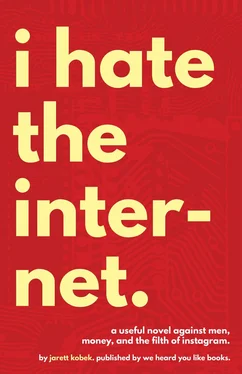Christine had started dating a new guy. He was named Bertrand. He was from Belgium and had no eumelanin in the basale stratum of his epidermis. Things were going well. Christine was in love.
But her rental situation was terrible.
Her landlord was considering using the Ellis Act. She knew this because Christine was the only tenant in the buildings with whom the landlord had a decent relationship.
He liked calling her up and complaining about how the property was ruining him.
When these telephone conversations began, Christine had not yet transitioned her outward conforming gender appearance. She’d been a woman living with the exterior appearance of a homosexual man.
At first she thought the landlord might be a closet case chasing a piece of strange, but years went by and he made no move or improper suggestion. Christine realized that the landlord just needed someone with whom he could talk about the buildings.
They became friends.
“Honey,” he said to her, “These buildings are murder! A girl like you knows from murder and isn’t this just the worst? You’re wonderful, you’re clean, but the others, they’re dogs! They pay so little. Do you know that Daria moved in when my mother was still alive? We’re talking 1973. My mother never raised the rent! I hate to do it but I’m going to have to get out of this rotten business.”
Daria was a woman without much eumelanin in the basale stratum of her epidermis. She had moved to San Francisco during the druggie heyday of the late 1960s and early 1970s.
She had been in her twenties and believed that enlightenment came in the form of vinyl records and sugar cubes laced with LSD. Now Daria was a senior citizen. She was paying less than $500 a month for a two bedroom apartment.
“Don’t even start me on Rafael,” said the landlord. “He lives like a pig.”
This was true. Rafael really did live like a pig.
“Honey,” said the landlord. “I must sell these buildings or do something. I can’t keep letting myself be robbed by animals!”
“You don’t think I’m an animal, do you?” asked Christine.
“You’re a doll,” said the landlord. “You’re the only star in my life.”
If Christine’s landlord did evict her, there was no feasible way that she could stay in the city. Low interest rates, venture capitalists and the tech industry had removed her ability to remain in San Francisco.
Christine’s biggest concern was that she was trans, which meant that she was a woman born with male physiology.
San Francisco was just about the friendliest place in America for a transperson. And even San Francisco was pretty bad. You still got heckled and threatened. Sometimes you would be beaten. Sometimes you would be killed.
Anywhere else that Christine moved would increase the likelihood of her being heckled, threatened, beaten and killed.
The threat of an Ellis Act eviction was the literal threat of violence.
More than ever, she felt the need for prayer.
In high school, Christine had gone through a Wicca phase.
Wicca was the name for a hodge-podge of beliefs centered on the idea that witchcraft retained validity in the modern world. Its practitioners thought that they could affect change through the use of spells and sorcery and invocations of pagan deities like Ba’al and Bast.
As with every religion, it was a comforting bit of nonsense that some people took too seriously.
Christine hadn’t really clicked with Wicca. Mostly, she’d used it as a way to have sex with awkward boys. She abandoned it after a few months.
Now that she’d developed the urge for prayer, she discovered a little splinter of Wicca was lodged in her heart.
She couldn’t see herself praying to Jesus or Allah or HaShem. Not even to Aten.
If she were going to pray, then her prayers must be pagan.
She hit upon the idea when she was thinking about Google.
Google was a company that was transforming the city. Google was the company that had flooded the city with its buses. Christine was sure that if she did get evicted, one of Google’s employees would end up in her apartment. Google was the company sending Christine to an increased likelihood of violent death at the hands of bigots.
Christine realized the names of the new gods. She knew where to direct her prayers.
Adeline was tweeting. She was defending herself on Twitter. Her WaNks Index Score was 5.
She’d asked J. Karacehennem if he would read her tweets and see how they played. He refused.
“Twitter makes everyone sound like a whinging fifteen year old,” he said.
At the end of her first week on Twitter, Adeline had about three thousand followers and had involved herself in countless disjointed conversations and arguments.
“I’m rather settling into this Twitter thing, darling,” she said over the phone to Baby. “After all, I’ve seen so much of life and I’m what the pornographers call a mature woman. I’m a MILF and all these young things are asking for life advice.”
“People on the Internet are completely insane,” said Baby. “Don’t open yourself up too much.”
“Darling, haven’t you been tweeting since 2008?” asked Adeline. “Weren’t you an early bird?”
Baby’s WaNks Index Score was 1.31411317.
“That’s professional obligation. You can’t really write Science Fiction without being on Twitter. It’s a necessity. But if you look at my tweets, I almost never say anything. It’s usually just jokes or random thoughts.”
“How can you stand it? How can you tolerate all the pretense?”
“It’s just a job,” said Baby. “It’s how I go to work.”
After Adeline graduated from Parsons, back in the early ‘90s, she had worked as a freelance illustrator. Then she transitioned into Trill and comic art.
She had never gone into an office. She had no idea that most people woke up every weekday morning and went to a place where they were disrespected and worked for people they hated. Adeline didn’t realize that when people went to their place of business, they put on a spiritual mask which hid their true selves and their actual opinions.
She’d never really had a job. There’d been two days when she clerked at Tower Records on Sunset Boulevard. That was back in 1984 and she’d taken the gig to prove a point.
She no longer remembered to whom.
Erik Willems had a Twitter account but he never tweeted. He used his account to read tweets written by people to whom he’d given money. His WaNks Index Score was 0.002.
When Adeline had asked him to critique her tweets, he said, “If you’re so concerned, you should hire a social media consultant.”
To which Adeline replied: “It is a truth universally acknowledged, that a single man in possession of a good tongue must be in want of the cupcake or the pastry.”
The people on Twitter were furious. Adeline couldn’t accustom herself to the anger.
They were outraged about sports figures.
They were outraged about politicians.
They were outraged about injustice.
They were outraged about world events in countries thousands of miles away with complex and impenetrable political systems.
They were outraged about comic books.
They were outraged about the privilege of others.
They were outraged about criminal cases.
They were outraged about poor people.
They were outraged about rich people.
They were outraged about the death of the middle class.
They were outraged about everything.
And no one would stop tweeting about television.
Adeline hadn’t owned a television since 1992.
Читать дальше












